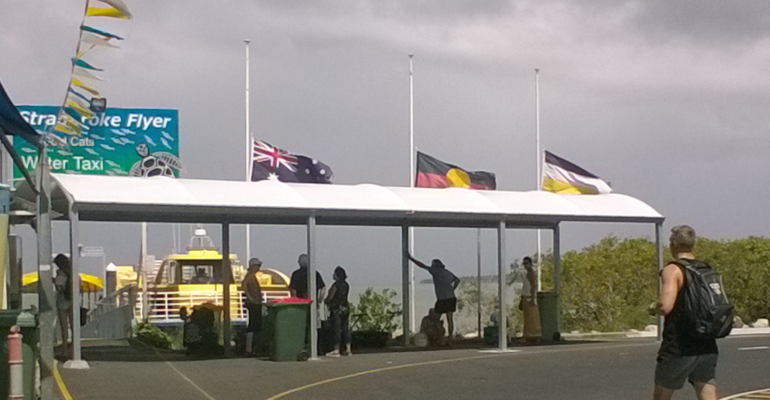
An elder has passed. A dear friend has departed. To her family condolences and consolations. For the rest of us, a time to reflect and to ponder how social justice might be progressed.
A Ngugi woman and Quandamooka elder, Joan lived her last decades on country, on Minjerribah. She served on national and state bodies, advised the Police Commissioner, served on Murri Court, and numerous others. Locally, she chaired the Quandamooka Forum, served the Housing Cooperative and many more.
Education was a passion; the first Indigenous appointment to the National Catholic Education Commission; Elder in Residence at Lourdes Hill College which named scholarships and Hendriks House after her. Australian Catholic University made her a Doctor of the University.
She seemed to do welcomes to country on a daily basis. Often taking the first boat to Cleveland and back on almost the last one. A hard task for someone of modest means. Each welcome to country was carefully and specifically prepared. Humanity and commitment to social justice were ever-present. Plus hard reminders to the audience that while Aboriginal people had been welcoming this could not be said for non-Aboriginal occupiers of her country. A point often made by reference to the treatment of refugees, boat people and Aboriginal people.
We live in unequal times – the gap (life expectancy, health, living standards and education) suffered by First Nations’ people being the most acute of many inequalities. The gaps are very large and the impacts too frequent. Grinding and daily poverty, lateral violence, domestic violence, suicide and poor housing co-exist with conspicuous consumption, mansion-size holiday homes and claims for privilege. And the destruction and degradation of nature in the name of progress and development. These are all things that Joan talked about in private and public. Plus joyous things including art, education, history, family and communities.
Minjerribah is now a place of Aboriginal and non-Aboriginal people. As a former Prime Minister said, it was the non-Aboriginal people who brought the guns and the diseases; who took the land. Despite this, culture and community has survived. Joan was part of that survival and, as an elder, undertook an immense load to rebuild her culture and community.
She was advocate, teacher and celebrant to her community. She also ministered and spoke to non-Aboriginal people most especially in her calls for reconciliation.
Reconciliation has many definitions: some think it defeatist; others think it unnecessary. At its best, reconciliation seeks a common community where distinctions based on race (or class, gender, ethnicity or sexuality) have no place. It is a community where people contribute to a shared and social good. A community where concerns of self and demands for individual rewards are secondary.
Joan’s reconciliation was one of shared hope and equality where everyone contributes because of no other reason than every one believes in contributing. It is also a world of peace – locally, nationally, globally. The moral of the formal welcome to country, of which she did so many, is to challenge people to come together without violence and in a profound peace.
Elders are not embedded in the cultures of non-Aboriginal people. It is remarkable how many Minjerribah people, irrespective of their origin, acknowledge if not prize, the Quandamooka aunties and uncles. We too have lost a treasured Aunty.”
Vale Joan
Howard Guille
27 January 2020
Minjerribah
This statement is written out of close friendship with Joan; we cooperated on many projects and activities. Her family have approved the statement.
Redlands2030 – 29 January 2020
Please note: Offensive or off-topic comments will be deleted. If offended by any published comment please email thereporter@redlands2030.net